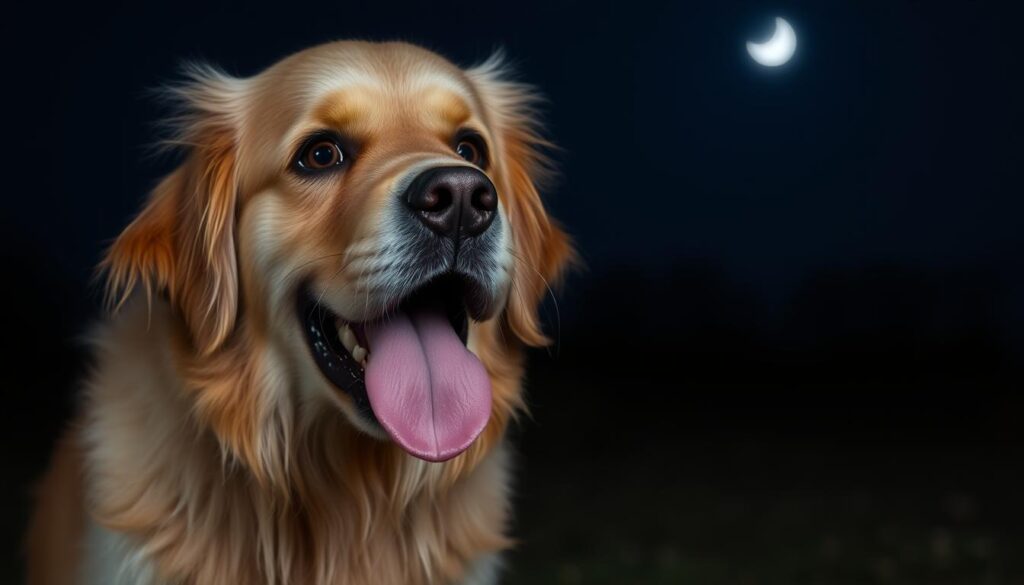
As pet parents, we worry when our dogs pant often at night. Nighttime panting can have many reasons, from normal to serious health issues. Dog panting at night isn’t always a sign of trouble. But it’s essential to know why it happens. Your dog might be uncomfortable, trying to cool down, or facing a serious health problem. This guide will help you figure out why your dog pants at night. We’ll look at different reasons for excessive panting. And we’ll give you tips to keep your dog comfortable and healthy. Dog Panting at Night.
Key Takeaways
- Nighttime panting can stem from multiple causes
- Understanding normal vs. abnormal panting is crucial
- Environmental factors significantly impact a dog’s breathing
- Age and health play important roles in panting behaviour
- Professional veterinary consultation is essential for persistent issues
Understanding Normal vs. Excessive Dog Panting at Night
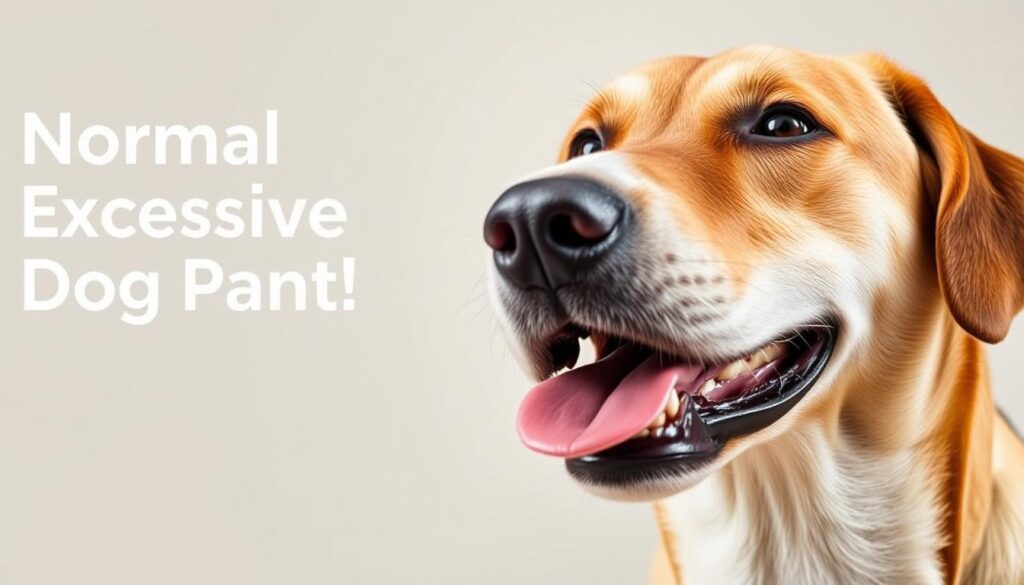
Figuring out why your dog pants can be like solving a mystery! Every dog owner wants to know when it’s okay or not. Dogs pant to cool down, but too much panting can mean they’re not feeling well.
Let’s look at what makes normal panting different from bad nighttime breathing!
What Constitutes Normal Panting Behaviour
Normal dog panting happens in certain situations:
- After they’ve been active
- When it’s hot outside
- When they’re excited or stressed
- As a way to cool down
Signs of Problematic Nighttime Panting
Watch for these signs of foul nighttime panting:
- Rapid, intense breathing without a reason
- Painting that goes on for hours
- Whimpering or restlessness while panting
- Changes in how they breathe
When to Be Concerned About Your Dog’s Panting
Excessive panting can mean something serious is going on. Look out for these warning signs:
- Panting that keeps them awake
- Hard breathing
- Panting with tiredness
- Changes in how they pant
Always listen to your gut! If you’re not sure about your dog’s panting, talking to a vet can help. They can give you peace of mind and expert advice.
Common Reasons for Dog Panting at Night
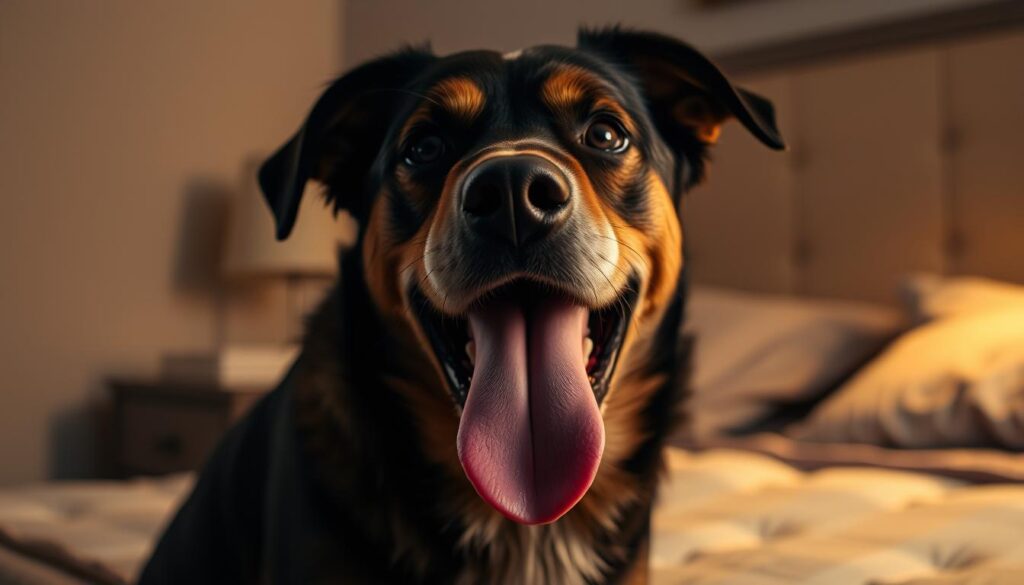
Dog panting at night can worry pet owners. Knowing why dogs pant at night helps solve their discomfort. This ensures a good night’s sleep for your furry friend.
Several factors cause nighttime panting and restlessness in dogs. Let’s look at the main reasons your pup might be awake:
- Temperature Discomfort: Dogs can get too hot, especially in warm bedrooms or with thick bedding
- Anxiety and Stress: Nighttime can make dogs feel anxious, leading to more panting
- Pain or Underlying Medical Conditions: Health issues might cause dogs to pant more at night
- Age-Related Changes: Senior dogs often pant more due to breathing or heart problems
Environmental factors greatly affect dog panting at night. The temperature of your dog’s sleeping area, bedding, and comfort level matter a lot. Dogs pant to cool down, so a warm room can make them breathe more.
Medical conditions also play a big role. Respiratory issues, heart disease, or chronic pain can make dogs pant more at night. If your dog pants a lot and seems restless or whimpery, see a vet.
Emotional well-being is key too. Dogs with anxiety, fear, or stress might pant more. Changes in routine, new places, or feeling left out can make them breathe harder at night.
Heat-Related Issues and Nighttime Panting
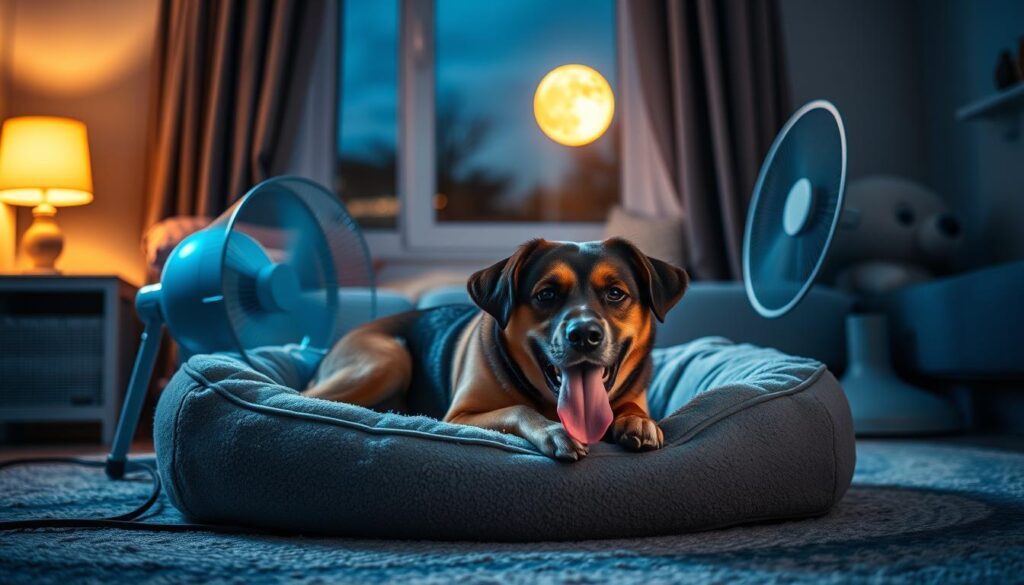
Dog panting at night can be a sign of overheating. This is a serious health risk for your pet. Understanding how temperature and environment affect your dog’s comfort is essential.
Room Temperature and Sleeping Environment
Dogs are susceptible to temperature changes, and overheating at night can happen faster than you think. The best sleeping spots should be cool and comfortable, between 68 and 72 degrees Fahrenheit.
Rooms that are too warm can cause your dog to pant excessively, which can lead to heat exhaustion.
- Keep bedroom windows slightly open for air circulation
- Use fans to create gentle airflow
- Avoid placing dog beds near direct heat sources
- Consider cooling mats for temperature-sensitive breeds
Impact of Bedding and Sleeping Arrangements
The bedding your dog uses is key to keeping them cool. Thick, heavy beds can trap heat, leading to overheating at night. Choose breathable materials like cotton or cooling fabrics that help keep your dog cool.
Signs of Heat Exhaustion During Sleep
Look out for signs of heat-related distress, such as:
- Excessive, rapid panting
- Restlessness and frequent position changes
- Drooling more than usual
- Pale or bright red gums
- Weakness or disorientation
If you see these signs, move your dog to a cooler spot and give them fresh water. Preventing overheating is always better than treating it!
Medical Conditions That Cause Excessive Panting
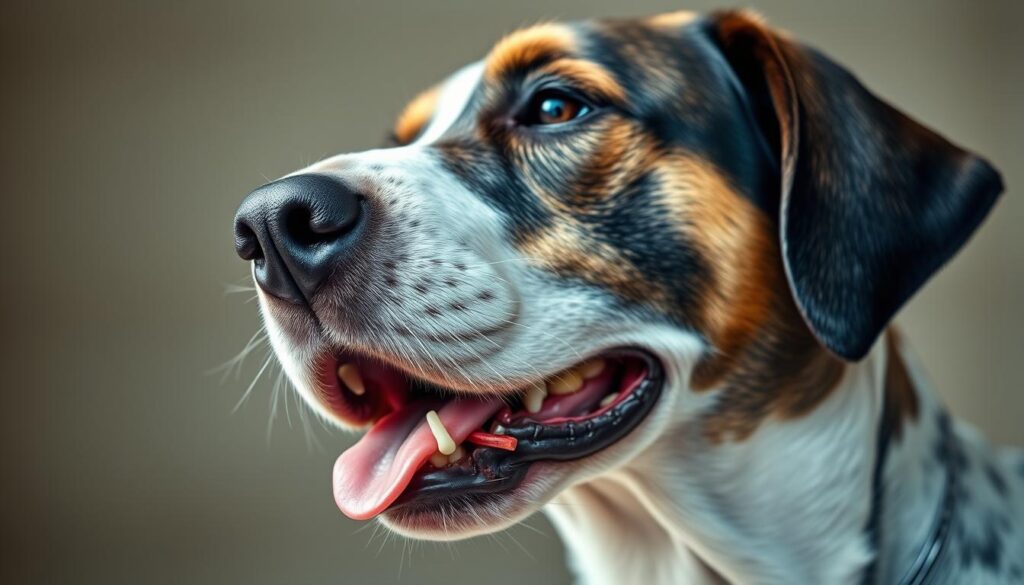
Dog panting can be a sign of serious health issues. Knowing what medical conditions can cause it helps owners spot when their pets need a vet.
Many serious health problems show up as abnormal panting. Heart issues, for example, make dogs breathe harder at night.
- Cardiac diseases that impact dog panting causes
- Respiratory system complications
- Hormonal imbalances
- Neurological disorders
Some specific conditions linked to nighttime panting include:
| Medical Condition | Potential Panting Symptoms |
|---|---|
| Cushing’s Disease | Excessive panting, increased thirst |
| Congestive Heart Failure | Rapid breathing, reduced energy |
| Respiratory Infections | Labored breathing, persistent cough |
Look out for other signs like changes in appetite or unexpected weight loss. These could mean your dog has a more serious issue that needs vet care right away.
If your dog’s panting doesn’t seem right, see a vet. Early treatment can really help your pet’s health!
Anxiety and Stress-Related Nighttime Panting
Nighttime can be tough for dogs with anxiety. They often pant at night due to stress. It’s important to understand and help them.
Identifying Anxiety Triggers
Dog anxiety panting comes from many things. Knowing what causes it helps owners help their pets. Common causes include:
- Sudden loud noises (thunderstorms, fireworks)
- Changes in household routine
- Separation from family members
- New pets or family members
- Previous traumatic experiences
Behavioral Signs of Stress
Dogs with anxiety show certain behaviors. Knowing these signs helps owners help their pets:
| Behavior | Potential Stress Indicator |
|---|---|
| Excessive panting | High anxiety levels |
| Trembling | Fear or extreme nervousness |
| Pacing | Restlessness and discomfort |
| Whimpering | Emotional distress |
Creating a Calming Environment
A soothing bedtime routine can help. Try these ideas:
- Establish a consistent bedtime routine
- Create a quiet, comfortable sleeping space
- Use calming music or white noise
- Provide a comfortable, familiar blanket
- Consider anxiety-reducing products like weighted blankets
Understanding and addressing your dog’s nighttime anxiety is key. It helps them feel secure and reduces panting. Remember, patience and consistent support are crucial.
Age-Related Factors in Nighttime Panting
As dogs get older, they often start panting more at night. Senior dogs face special breathing challenges that affect their sleep. Knowing about these changes helps owners take better care of their aging pets.
Dog panting in old age comes from many physical changes. Older dogs may breathe more at night due to breathing problems. These small changes can show big health issues.
- Muscle weakness affecting respiratory control
- Reduced lung elasticity
- Decreased cardiovascular efficiency
- Potential neurological changes
As dogs age, panting at night and illness link together more closely. Heart disease, brain issues, and metabolic problems can cause dogs to pant a lot. Keep an eye on your senior dog’s breathing.
| Age Range | Panting Characteristics | Recommended Action |
|---|---|---|
| 7-10 years | Occasional increased nighttime breathing | Regular veterinary check-ups |
| 10-13 years | More frequent nocturnal panting | Comprehensive health screening |
| 13+ years | Potentially constant respiratory changes | Advanced diagnostic evaluation |
To help with nighttime panting, make your senior dog’s sleep area comfy. Use orthopaedic bedding, keep the room cool, and avoid stress.
Exercise and Physical Activity Effects
Dogs love to play, but it can cause them to pant at night. Knowing how exercise affects their breathing is key to their health.
After playing hard, dogs often breathe more and pant. This heavy breathing at night usually comes from exercise. How long they pant after depends on:
- The dog’s age and fitness level
- Intensity of the exercise
- Environmental temperature
- An individual dog’s metabolism
Managing Post-Exercise Recovery: Common Causes of Nighttime Dog Panting
It’s essential to cool down dogs after exercise. This helps prevent dehydration and heavy breathing at night. Here’s how to help your dog recover:
- Provide fresh, cool water right after exercise
- Let them cool down with gentle walks
- Rest in a cool, well-ventilated area
- Keep an eye on their breathing and hydration
Look out for signs of too much exercise. These include long, heavy breathing, excessive drooling, or feeling very tired. These could mean your dog needs more time to rest or is stressed from the activity.
Respiratory Issues and Breathing Difficulties
Dog respiratory distress can be scary for pet owners. It’s essential to know the signs of breathing trouble. Dogs may have different respiratory problems that cause heavy panting, especially at night.
Common respiratory issues that cause breathing trouble include:
- Kennel cough
- Bronchitis
- Pneumonia
- Allergic reactions
- Heart disease
Spotting symptoms early can help your dog’s health a lot. Look out for these signs of respiratory problems:
- Persistent coughing
- Wheezing or raspy breathing
- Rapid or laboured breathing
- Blue-tinged gums
- Reduced energy levels
| Respiratory Condition | Primary Symptoms | Potential Severity |
|---|---|---|
| Kennel Cough | Dry, honking cough | Mild to Moderate |
| Pneumonia | Wet cough, fever | Serious |
| Allergic Reaction | Wheezing, rapid breathing | Variable |
Some dogs, like Bulldogs and Pugs, are more likely to have breathing problems. If your dog has trouble breathing, see a vet right away. Early treatment can stop serious problems and keep your dog healthy and happy!
When to Seek Veterinary Care: Dog Panting at Night
Knowing when to worry about your dog’s panting at night is key to their health. Different factors can increase the risk of panting. Some signs are so severe, they need vet care right away. Spotting these signs early can save your dog’s life.
Nighttime panting can be a big concern if it comes with certain symptoms. The first step in treating it is to watch your dog closely.
Critical Emergency Warning Signs: Dog Panting at Night
Look out for these urgent signs that mean you need to see a vet fast:
- Extreme difficulty breathing
- Pale or blue-tinged gums
- Excessive drooling with panting
- Rapid heart rate
- Uncontrollable shaking or trembling
Preparing Documentation for Your Vet Visit
When you book an emergency vet visit, gather all your dog’s health records. This will help the vet quickly diagnose what’s wrong.
| Documentation Item | Details to Include |
|---|---|
| Panting Frequency | Time of day, duration, intensity |
| Recent Changes | Diet, exercise, environment, stress levels |
| Other Symptoms | Coughing, lethargy, appetite changes |
| Medical History | Previous health conditions, medications |
Your quick thinking and detailed notes can be a lifesaver! Trust your gut and call a vet if your dog’s health looks off.
Home Remedies and Prevention Strategies: Dog Panting at Night
Dealing with a panting dog at night can be tough. But we have some practical tips to help your furry friend relax. Making a calm environment is crucial to reduce stress and panting at night.
Here are some practical ways to treat panting at home:
- Create a cool sleeping area with good air circulation
- Use breathable bedding materials
- Establish a consistent bedtime routine
- Minimise nighttime anxiety triggers
It is important to keep your dog’s sleeping area cool. For comfort, we suggest keeping it between 60 and 68 degrees Fahrenheit.
| Remedy Type | Recommended Action | Expected Benefit |
|---|---|---|
| Cooling Techniques | Elevated bed, fan circulation | Reduces heat retention |
| Anxiety Reduction | Calming music, white noise | Decreases stress-related panting |
| Nighttime Routine | Consistent feeding, walking schedule | Promotes relaxation |
Natural calming supplements like chamomile or lavender can help. Always check with your vet before trying new treatments to ensure they’re safe.
While these remedies can help, see a vet if your dog’s panting doesn’t stop or gets worse. They can check for any health issues.
Conclusion
Understanding why dogs pant at night is key to keeping them healthy. We’ve looked at many reasons, from health issues to environmental factors. This knowledge helps owners care for their dogs’ breathing at night.
Dogs may pant due to being too hot or serious health problems. Spotting early signs and acting fast can greatly improve your dog’s life. Regular vet visits and watching your dog closely are essential.
Every dog is different, so what works for one might not work for another. Focus on your dog’s unique needs, make their sleep area comfy, and be patient. If you’re unsure, always talk to a vet for advice tailored to your dog.
Your effort to understand and solve nighttime panting shows how much you care for your dog. You help your dog stay happy and healthy by staying informed and quick to act. Together, you’ll have many more fun times ahead!
FAQ
Why is my dog panting excessively at night?
Dogs may pant at night for many reasons, including heat, anxiety, pain, medical issues, or age changes. Common causes include room temperature, stress, breathing problems, heart issues, or excitement before bed. If your dog’s panting is odd or lasts long, see a vet to check for health problems.
Is nighttime panting normal for dogs?
Some panting is okay, like after exercise or in warm places. But too much panting at night might mean there’s a problem. Normal panting helps dogs cool down and is usually short. If panting is constant, heavy, or with other signs, it could be a health issue.
When should I be worried about my dog’s nighttime panting?
Be worried if your dog’s panting is excessive and lasts a long time, with signs like tiredness, no appetite, or hard breathing, starts suddenly or is different, Shows signs of pain or distress, or goes on for a long time without reason. Seeing a vet is important to check for serious health issues.
Can anxiety cause nighttime panting in dogs? Dog Panting at Night?
Yes, anxiety can make dogs pant at night. Stress can come from loud noises, changes, separation, or past bad experiences. A calm sleep area, calming music, and a regular bedtime routine can help reduce anxiety panting.
How can I help reduce my dog’s nighttime panting?
Here are ways to reduce nighttime panting: – Keep their sleep area cool and comfy – Use a fan or air conditioning – Make sure they have fresh water – Have a calm bedtime routine – Use calming music or pheromone diffusers – Check for health issues – Keep their exercise and eating schedule regular. If panting doesn’t get better, talk to your vet for advice.
Could my dog’s age be causing increased nighttime panting? Dog Panting at Night?
Yes, older dogs may pant more at night. They might have trouble cooling down, more anxiety, or health problems. Senior dogs could have smaller lungs or breathing issues. Regular vet visits are key to managing age-related changes.
Is nighttime panting a sign of a serious medical condition? Dog Panting at Night?
Not all night panting is serious, but it can be a sign of many health issues. These include heart disease, breathing problems, Cushing’s disease, pain, hormonal imbalances, or neurological issues. If panting is ongoing, with other symptoms, or seems odd, get your dog checked by a vet.




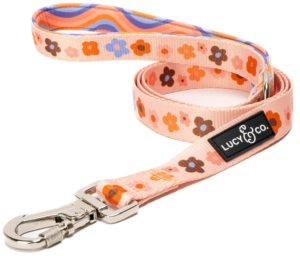

The theme is interesting, I will take part in discussion. I know, that together we can come to a right answer.
My brother suggested I would possibly like this web site. He was once entirely right. This post actually made my day. You can not imagine just how so much time I had spent for this information! Thanks!